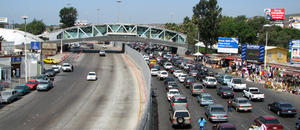Border securityClimate change could intensify Mexican migration to U.S.: study
A study published in the Proceedings of the National Academy of Sciences argues that global warming could drive millions more Mexicans into the United States in search of work by 2080 due to diminishing crop yields in Mexico; a 1.8 to 5.4 degrees Fahrenheit increase in temperature by 2080, unless agricultural methods have been adapted, would mean crop yields in Mexico would fall by 39 to 48 percent

Typical traffic at the U.S.- Mexico border // Source: youthspecialties.com
Conflict brought on by droughts, famine, and unwelcome migration are as old as history itself. A growing number of military analysts think, however, that climate change will exacerbate these problems worldwide and are encouraging countries to prepare to maintain order even as shrinking resources make their citizens more desperate (“U.S., U.K. military leaders address climate change’s role as a global threat multiplier,” 7 July 2010 HSNW).
Closer to home, global warming could drive millions more Mexicans into the United States in search of work by 2080 due to diminishing crop yields in Mexico, a study released Monday showed. “Depending on the warming scenarios used and adaptation levels assumed… climate change is estimated to induce 1.4 to 6.7 million adult Mexicans (or 2 percent to 10 percent of the current population aged 15-65 years) to emigrate as a result of declines in agricultural productivity alone,” the study said.
Researchers led by Michael Oppenheimer of the Woodrow Wilson School of Public and International Affairs at Princeton University estimated the sensitivity of migration to climate change and predicted the number of Mexicans who would migrate under a range of different climate and crop yield scenarios.
AFP reports that the worst-case scenario would occur if temperatures were to rise by one to three degrees Celsius (1.8 to 5.4 degrees Fahrenheit) by 2080, if farming methods had not been adapted to cope with global warming, and if higher levels of atmospheric carbon dioxide had not spurred plant growth. This would mean crop yields in Mexico would fall by 39 to 48 percent, the study said.
“In that case, the increase in Mexico’s emigration as a share of population would be between 7.8 percent and 9.6 percent,” said the study, which was published in the Proceedings of the National Academy of Sciences.
“Using today’s population of 70 million as the base for the age 15-65 year population in Mexico, this percentage increase corresponds to an additional 5.5 to 6.7 million emigrants,” it said.
The study focused on Mexico because it is “one of the biggest migrant-source countries, because there exists state-level data on emigration, and because it has undergone diverse degrees of climate variability across regions.”
The findings are relevant to the many countries in Africa, south Asia, and Latin America, and even to Australia, where the authors of the study predict migration will become a “significant issue” as climate change drives temperatures up and crop yields down.
—Read more in Shuaizhang Feng et al., “Linkages among climate change, crop yields and Mexico-U.S. cross-border migration,” PNAS (24 June 2010) (doi:10.1073/pnas.1002632107)
